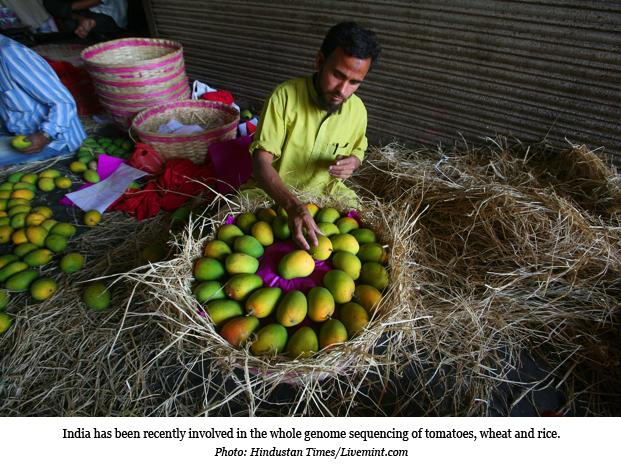by Nikita Mehta, Livemint
India is working on sequencing the genome of the country’s beloved summer fruit, the mango.
A number of government institutions are involved in the genome sequencing of several crops including fruits and vegetables, minister of state for science & technology and earth sciences Y.S. Chowdhary informed the Lok Sabha on Wednesday.

India has been recently involved in the whole genome sequencing of tomatoes, wheat and rice.
“Sequencing the genome can help us do more biology and once you carry out more pathway characterization, then you can manipulate the traits of the fruit or vegetable,” said M.K. Bhan, founder chairman of the Biotechnology Industry Research Assistance Council and former secretary, department of biotechnology (DBT).
“In the case of the mango, once we have sequenced the genome, we can find out how mango tastes the way an Alphonso does, why some mangoes perish later… The genomic information of the fruit can be used to understand its various traits,” Bhan explained.
The institutes involved in the project are National Research Center on Plant Biotechnology, New Delhi; Indian Agricultural Research Institute, New Delhi; Central Institute for Subtropical Horticulture, Lucknow; Indian Institute of Horticultural Research, Bangalore; and Indian Agricultural Statistics Research Institute, New Delhi.
The program aims to increase the shelf life in tomatoes and also improve its nutritional content such as carotenoids and folate.
“The Department of Biotechnology is also funding a major research program on Tomato metabolomics where information derived from genome sequence data would be used to enhance vitamins such as carotenoids and folate levels in tomato fruits,” said Chowdhary.
Meanwhile DBT is finalizing the draft for a National Biotechnology Development Strategy II which would seek to encourage life sciences education, research and entrepreneurship.
“The strategy seeks to address a number of identified challenges in terms of tailor-made human capital for scientific research and entrepreneurship; research priorities, resources, and core facilities,” Chowdhury informed the Lok Sabha.
Other areas that the draft will be addressing are creation of investment capital, intellectual property regime, technology transfer, regulation standards and accreditation, and biotechnology partnerships between public and private sectors both nationally and globally.
Source: Livemint
